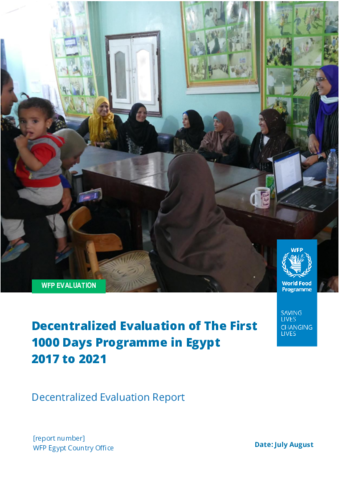
The primary beneficiaries targeted were Pregnant and Lactating Women (PLW) and their children under two years of age within the national safety net of Takaful and Karama managed by the Ministry of Social Solidarity (MoSS).
This Evaluation serves the dual and mutually reinforcing objectives of accountability and learning. The evaluation identifies achievements and areas of improvement to contribute to the discussion on WFP’s strategic and operational direction in Egypt. It also provides evidence-based findings to inform operational and strategic decision making and contributes to the formulation of the upcoming WFP Egypt CSP. The Evaluation assessed activities against the following evaluation criteria: Relevance, Effectiveness, Efficiency, Sustainability, and Coverage. The Evaluation questions examined the extent to which the design of the programme was relevant to local context, whether it was implemented in the most efficient way, and if intended objectives of the Program were achieved. The DE also looked at the expected lasting benefits of the Program and whether the program reached key target groups.
According to this evaluation the 1) programme aligns with the WFP CSP and complements key GOE initiatives, 2) The pivot to UCCT was highly relevant to the GOE agenda during the COVID-19. Despite funding shortages, both WFP and its donors demonstrated remarkable flexibility in re-allocating funds, yet the shift weakened strategic partnerships with GOE institutions, 3) Significant funding and operational challenges impacted efficiency, 4) The programme achieved a documented level of implementation; meanwhile, due to challenges the initial top-line objectives of the programme were not achieved. Also, the limited availability of performance data and lack of clear deviation narratives to explain and understand progress per output indicator prevented a conclusive evaluation of quantitative outputs, 5) The Government officially integrated WFP’s First 1,000 Days as part of Takaful’s conditional CBT programme. MoSS’s future agenda includes integration of the First 1000 Days programme into a GOE-funded family development initiative, 6) Administrative challenges, as well as funding challenges, limited WFP’s ability to reach targeted beneficiaries.
Based on this evaluation, 3 strategic and 7 operational recommendations were made.
-
Develop a more structured approach to programme design supported by a well-developed Theory of Change.
-
Conduct detailed capacity assessment of partner GOE and develop measurable action plan
-
Establish data monitoring plans, tools, and standard processes, designed against the programme’s TOC
-
Conduct an assessment to understand the channels that beneficiaries use to obtain health care information
-
Synchronizing the arrival of assistance at the distribution point with the messaging to beneficiaries.
-
Select distribution points that correspond to geographical clusters where target communities reside.
-
Factor in the transaction costs incurred by beneficiaries to receive the assistance.
-
Plan and conduct joint awareness sessions that bring together beneficiaries and retailers.
-
Strengthen coordination and communication systems
-
Strengthen the intentional coordination between development actors and other governmental initiatives
